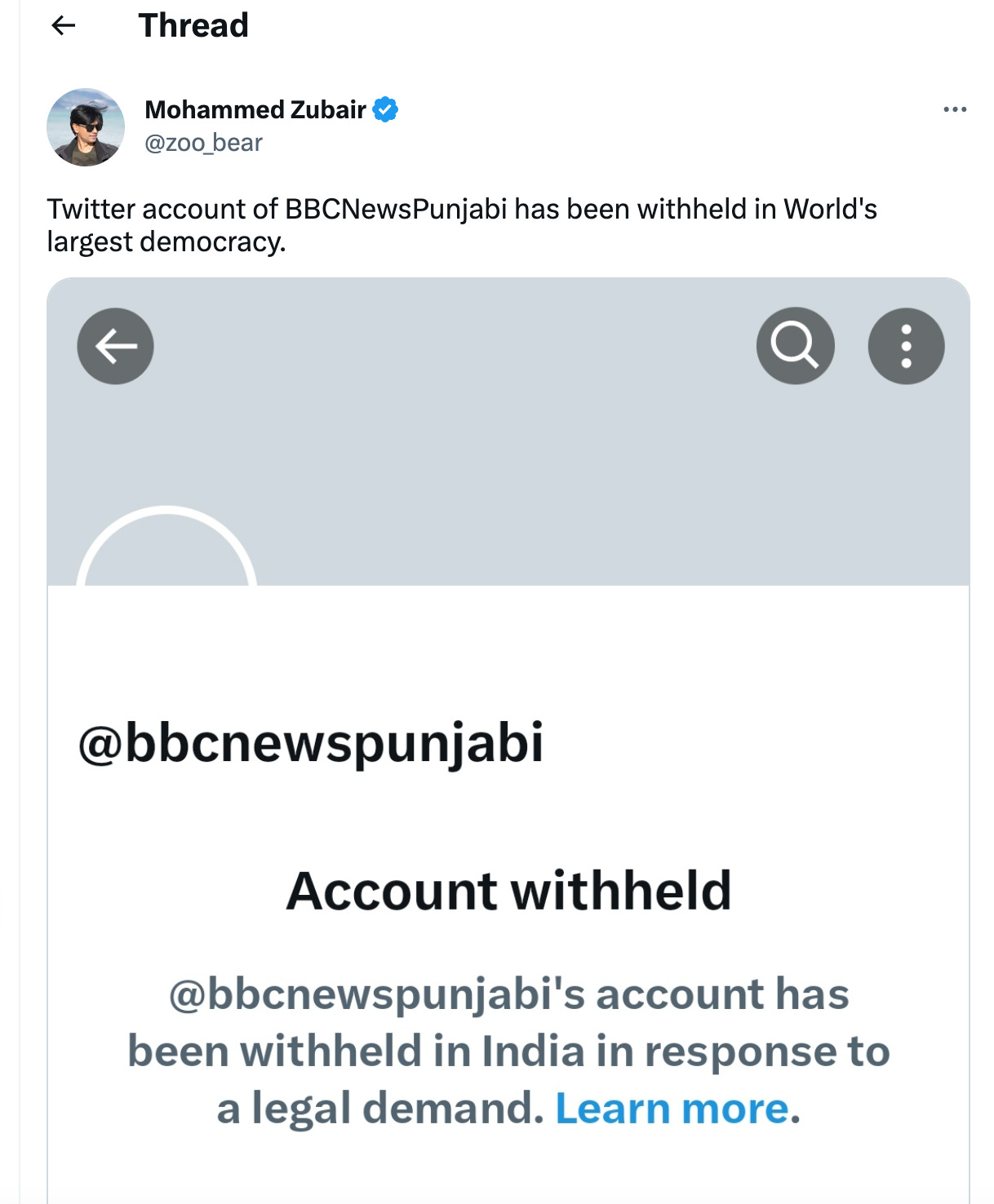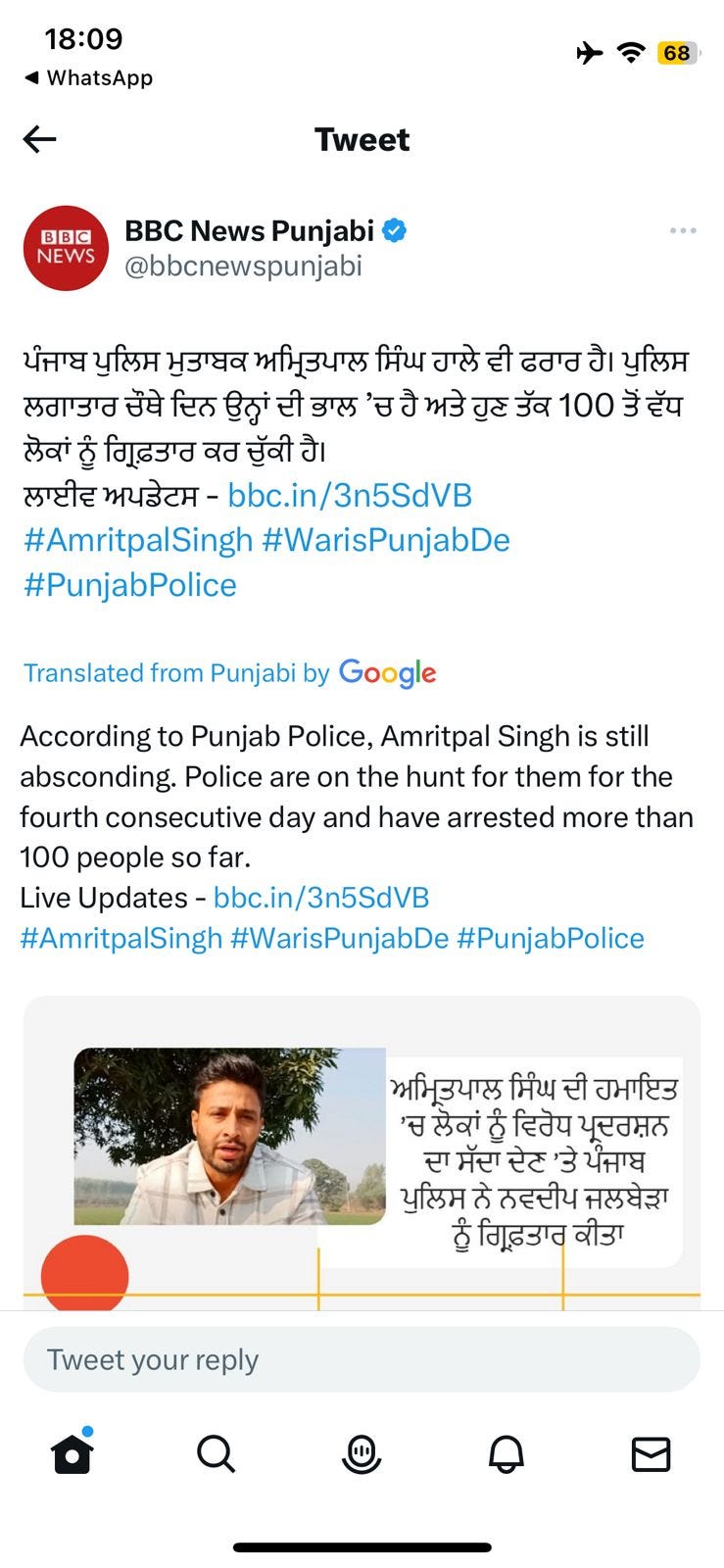Did Twitter Accidentally Block a BBC Handle in India?
The Narendra Modi government wanted two tweets by BBC News Punjabi taken down. But the whole account was taken down. Why? Was it a case of wrong labelling or something more?
Note from Kabir: This is the first time I am publishing a guest post and I think it's blockbuster stuff. It is a series of two articles on the issue of online censorship in India written by one of India’s best tech journalists and a close friend of this newsletter, Anuj Srivas.
The first article in this series takes a look at the strange case of a BBC Twitter handle having been blocked for several hours seemingly at the Indian government’s request. Or was it because Twitter made a mistake?
The second article will take a look at how tweets by CNN, Amnesty International, journalist Aditya Raj Kaul and more were also blocked.
So, here we go! Over to Anuj.
Over the last three weeks, the Indian government has asked Twitter to censor hundreds of accounts, tweets and hashtags as it seeks to quell unrest and crack down on alleged fake news in its attempt to arrest radical Sikh separatist leader Amritpal Singh.
Most of the content that has been blocked comes from accounts with a small number of followers that have primarily spread unverified information.
However, news reports have also highlighted a few of the more surprising cases of censorship: accounts belonging to Canadian lawmaker Jagmeet Singh, poet Rupi Kaur, Sangrur MP Smiranjit Singh Mann and Indian Express reporter Kamaldeep Singh.
And then there is the curious case of BBC News Punjabi whose Twitter handle was ‘withheld’ from viewing in India. It was later mysteriously restored.
What happened with BBC News Punjabi?
On the morning of March 28, people who went to the regional BBC Twitter account were greeted with a message that it had been withheld in India in response to a “legal demand”.
At the time, a few media outlets put out reports indicating that it was the result of a genuine legal demand put forth by the Indian government. A national security reporter tweeted that the account was censored because it had spread “misinformation on law and order situation in Punjab” and “anti-India propaganda”.
And yet, surprisingly, the BBC handle was back up at 3 PM on the same day and could be viewed by Twitter users in India. It was as if nothing happened.
So what transpired here? Was it blocked for fake news, or was there some kind of error? There are three possibilities, none of which reflect well on how online content is blocked or censored in India.
Scenario 1
The first possibility is that the Indian government did indeed ask for the BBC account to be taken down and then had a change of heart a few hours later. If this is the case, it seems a little strange for the government to decide the BBC was spreading misinformation and contributing to public disorder -- and then suddenly realise the media organisation was innocent.
It’s possible that the BBC and the government agency that took offence to the broadcaster’s content sat down and sorted out their differences, but that seems even more unlikely.
Furthermore, Twitter has yet to make public any legal request that would have required it to take down the BBC News Punjabi handle. The social media platform passes on content removal requests to the Lumen database, a third-party resource maintained by Harvard University, where anyone can check what the Indian government wants blocked.
So far the database does not contain any requests by the Indian government to block the BBC News Punjabi handle.
Scenario 2
The second possibility is that the BBC's account was taken down due to a violation of Twitter’s terms of service (ToS). The grounds for this comes from a media report, which quotes an unidentified source to say that the Ministry of Electronics and IT had conveyed to the BBC that no direction had been issued to block the Punjabi news account.
The same media report offered an alternative explanation: that the “handle had been reported en masse by Twitter users, which resulted in the suspension”.
There are two issues with this narrative.
First, any user on Twitter can report a tweet or account for a wide range of offences that violate the company’s terms of service (ToS). Twitter then reviews the user reports, and acts on the content if needed. The platform has a range of enforcement actions at its disposal. Some of these are temporary, like ‘locking’ an account, rendering it unable to tweet unless the account holder deletes a tweet that violated the company’s rules.
Other steps the company can take are more serious or permanent in nature. When Twitter goes down this route, it usually ensures that the account itself is completely removed from public view. Nobody can see their tweets, retweets or likes -- as was the case with the BBC News Punjabi.
In these cases, Twitter also slaps a label or message on the account, informing users as to what happened with it. When the company deems that an account has severely violated its rules, it can permanently suspend the account; the label that is slapped on and displayed to any user who tries to view the account is some variation of “account suspended” (see: Kanye West’s currently suspended account).
Now, none of these things happened to the BBC News Punjabi account. Instead, as noted above, the message that was displayed by Twitter was that the account was “withheld in response due to a legal demand”. Twitter itself notes that this kind of enforcement action is completely different from suspending an account due to ToS violations.
Historically, this message has been used in India to note that a tweet or account has been taken down due to a request by the Centre, or state government under Section 69A of the Information Technology Act, 2000. In a handful of cases, it has been used to indicate the tweet has been blocked due to a court order. In no circumstances is it used to indicate that the account violated any company rule.
But if that is the case, did the employees at Twitter just press the wrong button and incorrectly declare that the account was ‘withheld’ due to ‘legal reasons’?
And, if we believe that Twitter took down the BBC news account due to mass reporting by other users -- and then later restored it when it realised a mistake had been made -- does that mean the company has no safeguards in place to stop this from happening? No human intervention to ensure that the offending account actually broke the company’s terms of service before it is censored?
Scenario 3
Finally, an analysis of blocking orders uploaded to the Lumen databases shows that while the Indian government did not ask for the BBC Punjabi news account to be blocked, it did ask for two individual tweets to be censored.
Both tweets, shown below, cannot currently be viewed in India.
(Click here to view the Lumen blocking order for the two BBC tweets)
A translation of the tweets shows that they appear to be straightforward, describing news developments that took place during the ongoing manhunt for Amritpal Singh.
This is where things get even more interesting. The media report that offered the ‘mass trolling’ explanation also put forward another interesting bit of information: the Narendra Modi government allegedly intervened on behalf of the BBC by forwarding its grievance to Twitter. Why would the Indian government, which has a notoriously frosty relationship with the BBC, go out of its way to lobby for the BBC?
The fact that the Indian government wanted two tweets by the BBC News Punjabi to be blocked opens the door for a potentially troubling third outcome: did someone at Twitter block the whole account when they meant to censor only two tweets?
A questionnaire was sent to India’s IT ministry, as well as Twitter, before the publication of this article. This article will be updated when a response is received.
More transparency
In the first scenario, the Indian government is at fault, or at the very least has muddied and flawed processes when it comes to online censorship. In the other two scenarios, Twitter is at fault.
Transparency matters. Accountability matters. It is important to know why a tweet, account, or website is blocked and why it is restored. Even if the reasoning can’t be furnished immediately or in the moment, it should be done after the fact.
In the weeks and months before Elon Musk bought Twitter, the billionaire, who identifies as a ‘free speech absolutist’, spent much time decrying the previous management’s content moderation efforts.
“Given that Twitter serves as the de facto public town square, failing to adhere to free speech principles fundamentally undermines democracy,” he said.
He also, however, has repeatedly stressed that Twitter intends to respect the local law of any region, which can sometimes put him at odds with his commitment to free speech principles.
Since taking over, it’s unclear how much effort Musk has been putting in this direction, given that he has radically reduced the number of employees working on content moderation.
In January 2023, while responding to a report published by The Intercept, Musk said that he had been too busy to focus on the issue of how Twitter had censored links to the BBC documentary on Prime Minister Narendra Modi.
“First I’ve heard,” Musk wrote on January 25. “It is not possible for me to fix every aspect of Twitter worldwide overnight, while still running Tesla and SpaceX, among other things.”
Two months down the road, it appears he still hasn’t found the time.







